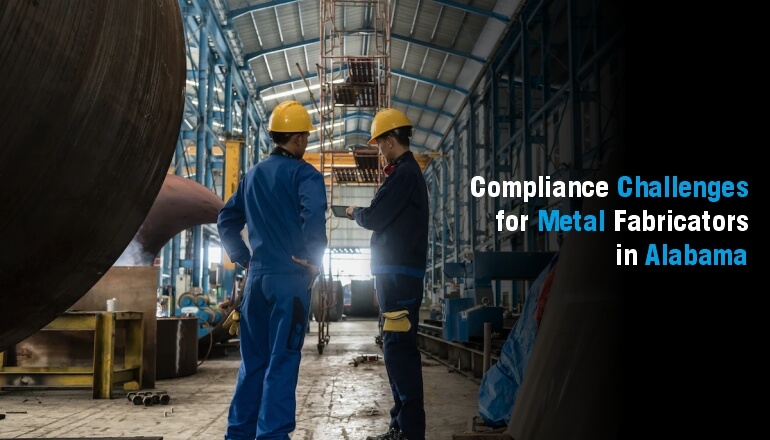Metal fabricators in Alabama face a myriad of compliance challenges in today’s regulatory landscape. From environmental standards to occupational health and safety regulations, ensuring adherence to state and federal requirements is crucial for the industry’s operations.
This article delves into the key areas of compliance that metal fabricators in Alabama need to navigate, including environmental compliance requirements, employee training needs, supply chain considerations, record-keeping obligations, and emerging technologies that offer solutions to these challenges. Understanding and addressing these compliance issues is essential for metal fabricators to maintain a safe, sustainable, and legally compliant operation in the state of Alabama.
Key Compliance Challenges for Metal Fabricators in Alabama
Regulatory Landscape for Metal Fabricators in Alabama
Metal fabricators in Alabama need to navigate a complex web of state and federal regulations to ensure compliance. From environmental standards to occupational safety laws, understanding and adhering to these regulations is crucial for the industry’s success.
1. Overview of State and Federal Regulations
Navigating the regulatory landscape for metal fabricators in Alabama involves compliance with a mix of state and federal regulations. Understanding how these regulations intersect and differ is key to avoiding costly violations and penalties.
2. Key Compliance Agencies and Authorities
Metal fabricators in Alabama must interface with various compliance agencies and authorities. From the Alabama Department of Environmental Management to the Occupational Safety and Health Administration (OSHA), knowing who to contact and how to stay in their good graces is vital.
Environmental Compliance Requirements
Adhering to environmental compliance requirements is paramount for metal fabricators in Alabama to minimize their impact on the environment and surrounding communities. From waste management to air quality control, these standards play a critical role in the industry’s sustainability.
1. Waste Management and Disposal Regulations
Proper waste management and disposal are essential for metal fabricators in Alabama. Understanding and following regulations around hazardous waste, recycling, and proper disposal methods are crucial for maintaining environmental compliance.
2. Air Quality Control Standards
Maintaining air quality control standards is imperative for metal fabricators in Alabama to mitigate emissions and pollutants. Adhering to regulations on emissions monitoring, pollution control, and air quality permits is essential for environmental compliance.
Occupational Health and Safety Regulations
Ensuring a safe work environment is a top priority for metal fabricators in Alabama to protect their employees and uphold industry standards. Adhering to occupational health and safety regulations is crucial for preventing workplace accidents and injuries.
1. OSHA Standards for Metal Fabrication Industry
Compliance with OSHA standards is non-negotiable for metal fabricators in Alabama. From machine guarding to hazard communication, adhering to these regulations is vital for creating a safe workplace environment and avoiding costly penalties.
2. Worker Protection and Safety Programs
Implementing comprehensive worker protection and safety programs is essential for metal fabricators in Alabama to promote a culture of safety among employees. From safety training to hazard identification, these programs are key to reducing workplace accidents and ensuring employee well-being.
Employee Training and Certification Needs
Investing in employee training and certification is crucial for metal fabricators in Alabama to ensure compliance with industry standards and regulations. Equipping workers with the necessary skills and certifications is vital for maintaining a knowledgeable and compliant workforce.
1. Training Programs for Safety and Compliance
Providing ongoing training programs for safety and compliance is essential for metal fabricators in Alabama. Keeping employees up to date on the latest regulations, safety procedures, and best practices is key to fostering a culture of compliance and minimizing risks.
2. Certification Requirements for Metal Fabrication Workers
Ensuring that metal fabrication workers in Alabama have the necessary certifications is vital for meeting industry standards and regulatory requirements. From welding certifications to equipment operation licenses, verifying workers’ credentials is crucial for maintaining compliance and quality standards in the industry.
Supply Chain Compliance Considerations
Sourcing and Procurement Compliance Navigating the labyrinth of suppliers and materials can make anyone feel like they’re playing a game of metal fabricator chess. But compliance is not a game. Ensuring your sourcing and procurement practices tick all the regulatory boxes is crucial. From verifying supplier certifications to tracking material origins, staying compliant means staying ahead of the game.
1. Vendor and Contractor Compliance Management
Working with vendors and contractors is like assembling a team for a heist – you need to trust them, but you also need to keep a close eye on everything they do. Managing compliance with external partners involves vetting their credentials, ensuring their practices align with regulations, and holding them accountable for their actions. It’s like building a compliance Avengers team but with fewer capes.
2. Record-keeping and Reporting Obligations
Documentation Requirements for Compliance In the world of metal fabrication compliance, paperwork is king. Keeping meticulous records of transactions, certifications, and processes is not just a bureaucratic chore – it’s your armor against compliance pitfalls. Remember, if it’s not documented, it never happened, at least in the eyes of regulators.
Reporting Procedures and Deadlines
Deadlines are like the ghosts that haunt compliance officers’ dreams – they’re always lurking, waiting to jump out when you least expect it. Reporting procedures are the roadmap to compliance success. Knowing what needs to be reported, how, and when can mean the difference between smooth sailing and a compliance nightmare. Stay on top of your deadlines, or risk being lost in a sea of regulatory paperwork.
1. Emerging Technologies and Compliance Solutions
Automation and Monitoring Technologies Gone are the days of manually tracking every compliance detail like a metal fabrication detective. Automation and monitoring technologies are the superheroes of compliance management, helping you keep track of everything from supplier certifications to production processes in real time. Embrace the tech sidekick, and watch your compliance woes disappear faster than metal shavings in a dust collector.
2. Software Solutions for Compliance Management
In a world where regulations are as complex as welding a titanium alloy, having the right software on your side is like having a secret weapon in your compliance arsenal. From streamlining documentation processes to generating compliance reports at the click of a button, software solutions are the Swiss Army knives of compliance management. Embrace the power of technology, and watch compliance become as easy as piecing together a metal puzzle.
Conclusion
In conclusion, staying abreast of compliance regulations is vital for metal fabricators in Alabama to operate successfully and responsibly. By proactively addressing environmental, safety, training, supply chain, and record-keeping requirements, businesses can mitigate risks, enhance their reputation, and contribute to a more sustainable industry.
Check also: 5 Benefits of Outsourcing Structural Steel Fabrication
Embracing emerging technologies and innovative compliance solutions can further streamline operations and ensure long-term compliance success. By prioritizing compliance efforts, metal fabricators in Alabama can thrive in a competitive industry while upholding ethical and legal standards.


